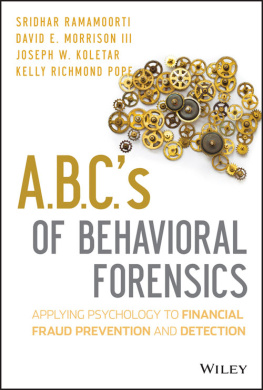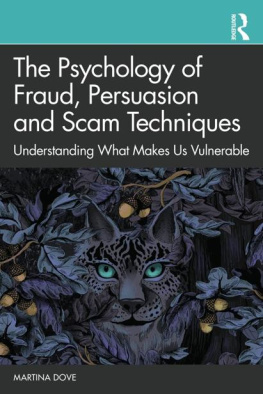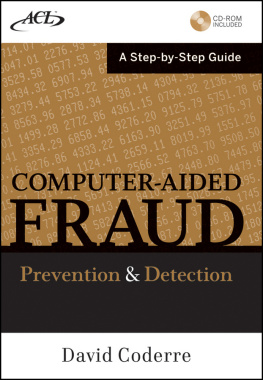Praise for
The A.B.C.'s of Behavioral Forensics: Applying Psychology to Financial Fraud Prevention and Detection
Fraud is an important part of enterprise risk. Although it falls in the finance and accounting function it is also a people issue. The authors have taken an important step forward in helping organizations by examining issues of relationships, emotions, narcissism, and larger group and organizational dynamics that will help leaders understand and deter fraud.
Harry M. Jansen Kraemer
Former CEO, Baxter International and
Professor of Leadership, Kellogg School of
Management, Northwestern University
I have known Sri for 25 years and have found him to be one of the most eclectic thinkers I have ever known. He draws his insights not only from his formal accounting and psychology education but also from a wide range of philosophic sources not often read by business students and practitioners. He has given considerable thought to a wide range of topics, including ethics, governance, and auditing. In A.B.C.'s of Behavioral Forensics , you will find that he and his coauthors have been adept at bringing a broad view of their diverse interests to bear on the emerging discipline of behavioral and financial forensics. You will, upon reflection, note that they have not only addressed the narrower issues of forensics but also the broader issues of philosophy, ethics, and governance. This book can be read usefully at the surface level or, given more time and thought, a reader will be led to think more deeply about how society is impacted when otherwise good people, particularly our leaders, violate their trust. Reading this book will be a good and profitable use of your time.
Andrew D. Bailey, Jr., PhD, CPA, CMA
Professor of Accounting Emeritus,
University of Illinois at Urbana-Champaign,
and former Deputy Chief Accountant,
U.S. Securities & Exchange Commission
Daven, Sri, Joe, and Kelly have done a great job of helping us understand the importance of recognizing the very personal and individual human factors that can drive someone to fraudulent behavior. They also provide insights and guidelines that can help us recognize the potential fraudster.
Peter Pesce
Partner Emeritus, A.T. Kearney
This excellent work forces us beyond any easy and dangerously narrow examination of fraud to the understanding of complex motivations that set in motion results that can be startling in their financial consequence. With recognizable and pertinent case studies, these exceptionally qualified authors demonstrate how certain human behavioral factors precede and enable a fraudbe it carried out by one person, a colluding group, or by suggestions from leadership. What the authors then do is thoroughly describe these defining emotions, the essential relationship between the fraud perpetrator and the victim, and what can lead an individual to reverse his or her honesty course.' With certain knowledge that fraud is theft, even though it is not carried out by force, and struggling with the question of why do people cross the line, the reader is moved to an understandable and professionally sophisticated discussion of the factors attributable to the human mind followed by the delivery of methods for identifying early-stage fraud and for mitigating its consequences. This critically important and highly readable book is essential for anyone responsible for or caring about businesses and organizations today, or for anyone desiring deeper insight into certain explanations for the considerable fraud that surrounds our daily lives.
Jameson A. Baxter
Chair, Putnam Funds
Leaders with integrity attempt to define and determine the personality characteristics of truth and honesty in themselves and others. However, it's a search often fraught with uncertainty. The A.B.C.'s of Behavioral Forensics will help you to be aware of the signals of devious behavior. Most important, it will increase your sensitivity to the importance of the issue. Corrupt activities are often allowed to continue due to our own indifference.
Duane R. Kullberg
Former CEO, Arthur Andersen & Co.
As a fraudster, I succeeded for almost two decades because I understood how to exploit the psychological and emotional weaknesses of my victims. This book teaches auditors and antifraud professionals about fraud psychology, the soft underbelly of fraudthe emotional manipulation, big and small lies, and other behavioral cues that fraudsters employ to successfully execute their crimes. I call it the art of spinning, and the authors have described it as the predator-prey dance. Without such an understanding of the behavioral dynamics of fraud, victims will always be doomed to lose (lots of money) and fraudsters will always have the upper hand.
Sam E. Antar
Former Crazy Eddie CFO, former CPA,
and a convicted felon
This is a brilliant idea for a book on the topic of fraud, which isn't always obvious to those being victimized. Understanding the psychological elements of how we rationalize behaviors associated with fraud enables our understanding of why even those whom we trust the most are capable of committing fraud. The authors have done a magnificent job of simply explaining the psychological and sociological characteristics of a fraudster. If you work with money, this book is a must read.
Russ Cancilla
Vice President & Chief Security Officer (retired), Baker Hughes
Our profession has a rich body of literature on the subject of fraud. Unfortunately, the literature has had a significant gap in understanding all elements of fraud and its motivation and execution. This book identifies and closes this gap by focusing on what is perhaps the most important key: psychology.
W. Ken Harmon, DBA
Provost and Vice President for Academic Affairs,
Professor of Accounting, Kennesaw State University
I'm often asked, What is the difference between an accountant and a forensic accountant?' and What distinguishes a forensic accountant from a good forensic accountant?' I've pondered these questions for years, but the answer to both questions invariably circles back to profiling the white-collar criminal. While all accountants focus on numbers (the quantitative), the forensic accountant must be in tune with the qualitative. In other words, to be a successful forensic accountant or fraud investigator, it is absolutely essential to understand the psychological mindset of the fraudster and the intangible attributes that cannot be captured on a balance sheet or income statement.
In A.B.C.'s of Behavioral Forensics , Dr. Ramamoorti and Dr. Morrison, along with Joe Koletar and Kelly Pope, introduce us to several intriguing charactersall of the characters are real-life fraudstersand take us on a journey through the concepts of psychology and psychiatry. Building and expanding on Cressey's fraud triangle, the authors do a wonderful job of weaving the clinical aspects of mind science' into a practical application of criminology, on a personal and attention-keeping level. With easy to understand language along the wayand literally providing the A.B.C.'s and building blocks for profiling corruption and white-collar crimethis book is a must read, whether fraud examination is just an interest for you, you're new to the profession, or you're a seasoned expert.
David Sawyer, CPA, CFF, CITP
Partner and Practice Leader,
Forensic Services, Frazier & Deeter LLC,
and four-time president of the
Georgia chapter of the Association
of Certified Fraud Examiners
This book is an important addition to the literature on behavioral forensics. At a time when corporate governance and risk mitigation are at the top of the agenda for governments and private enterprises in all sectors, the authors have skillfully dissected several ideas at the intersection of accounting and psychology. Of particular value are the several topical examples and anecdotes that elucidate the concepts discussed.






